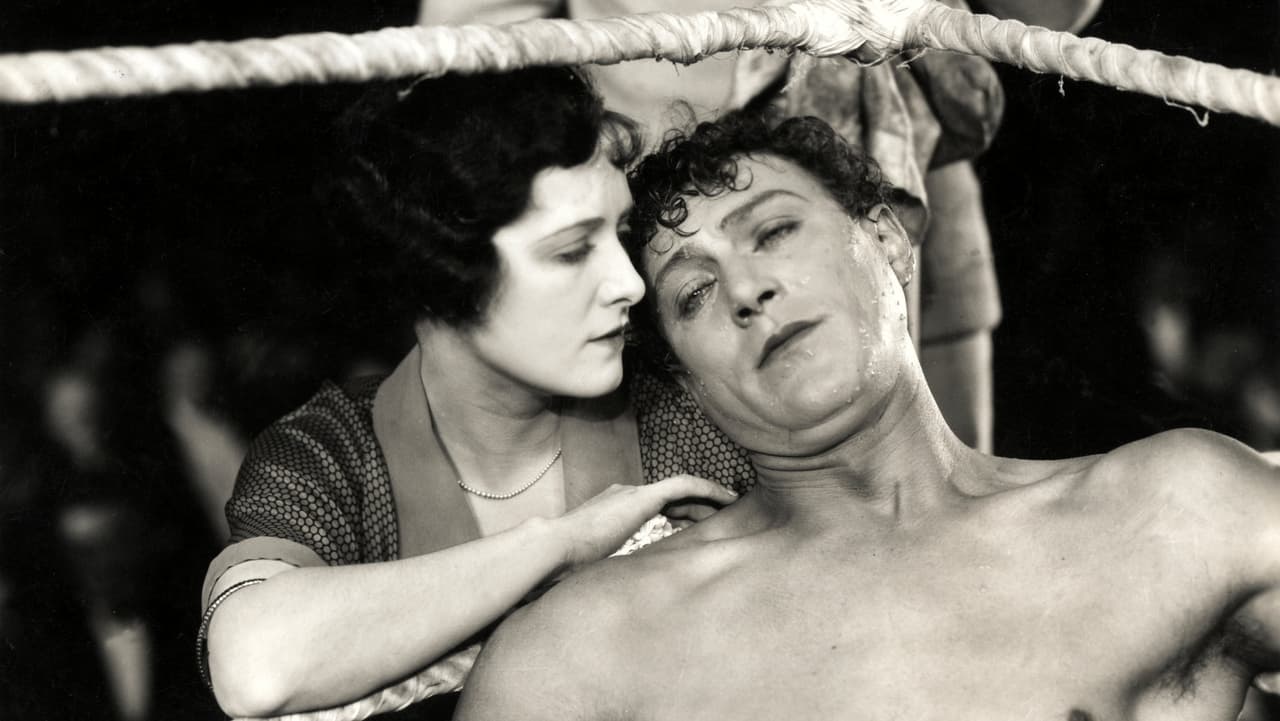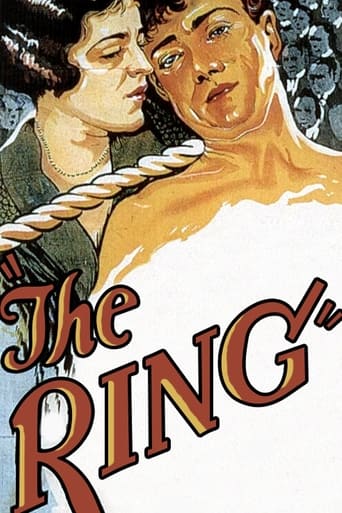



The performances transcend the film's tropes, grounding it in characters that feel more complete than this subgenre often produces.
View MoreI really wanted to like this movie. I feel terribly cynical trashing it, and that's why I'm giving it a middling 5. Actually, I'm giving it a 5 because there were some superb performances.
View MoreThis film is so real. It treats its characters with so much care and sensitivity.
View MoreI think this is a new genre that they're all sort of working their way through it and haven't got all the kinks worked out yet but it's a genre that works for me.
View MoreThis is a slow boring movie. With any awful story line. It so boring. Do not see this movie. If you what to see a good sports movie see Rocky IV. Do not bother with this boring Crap.
View MoreHitchcock's THE RING is merely a competently directed silent drama. The only distinguishing marks are in the abundant editing techniques, which is odd since the film's scene editing itself is often severely lacking in competence. Many of the scenes drag and run far too long, resulting in a lack of tension or interest. It could have been shortened easily by fifteen minutes to tighten the plot.It is basically a boxing story with a love triangle at its center. Sparring partners, one a champion, one a want to be, vie for the love of the aspirant's wife. The set-up at an amusement park and the first fight scene last for 18 minutes, far too long with very repetitious sequences. It is odd that both men have names, Jack and Bob, but the woman is known only as The Girl and is never given or referred to by a proper first name.The triangular situation goes on for two thirds of the film, before the husband finally confronts his wife at 1:05:00. The final fight itself is finally superbly shot and edited, lasting from an hour and 16 minutes to the conclusion at an hour and 29 minutes. It is said Scorcese found this sequence helpful in designing his Raging Bull. Finally, real suspense enters the film and lasts all to shortly.There are a number of close-ups, lapse dissolves, montages and superimpositions. A number of these are as follows: the opening amusement park, using close-up reactions and a hand- held camera to indicate giddiness; Jack with super-imposed heads of former rivals; an excellent lapse dissolve of Jack taking Bob's agent's hand in a handshake to Bob slipping a bracelet on the arm of Jack's wife; the wedding when Jack slips the ring on her finger and the bracelet gift slips down her arm into the frame; blurring of the hand-held camera to indicate drunkenness at the party; Bob's face on Jack's punching bag; dissolves of the fighting schedule with Jack moving farther up the competition; a montage of jazz age images with Bob kissing Jack's wife superimposed on a close-up of Jack.Gordon Harker is excellent as the promoter. He appeared in three of Hitchcock's silents. (In fact Hitch used to like to re-use people: Hall-Davis is in two; Brisson in two; Ivor Novello in two; and Hunter in two). Hall-Davis is as sweet here as she was in The Farmer's Wife, too sweet to be convincing as the two-timing wife. Hunter is merely adequate.Brisson is excellent, as he was in The Manxman. His career was a short one – only 13 films. A handsome and expressive leading man.So, in total, cinematography and editing techniques are the stars here, rather than the story line, narrative or dramatic scene construction. A good film, but in no way special as silent drama.
View MoreAn early triumph for the young Alfred Hitchcock, released in the same year as his better known "The Lodger: A Story of the London Fog", the boxing film "The Ring" deserves its own accolade as one of his more technically accomplished films from the silent movie era. Already the film features much symbolism in its name alone: there is the obvious reference to the boxing ring but the title also refers to a wedding ring, a bracelet and the love triangle that is the movie's heart. Themes familiar to Hitchcock fans are not so much in evidence here and the major attractions lie in Hitchcock's increasingly confident use of editing, montage, the camera as voyeur and development of character through action and emotion.Jack Sander (Carl Brisson) works his way up as a boxer from fighting amateurs at country fairs to professional level. His main ambition is to succeed at boxing and earn enough money to marry the cashier Mabel (Lillian Hall Davis). However Mabel meets another boxer, Bob Corby (Ian Hunter), and falls in love with him. As Sander wins his bouts, he marries Mabel and continues to fight but gradually discovers his wife is still attracted to Bob. He vows to keep on fighting to a level where he can seriously challenge Corby. Eventually the match is arranged and everyone in town turns up to watch the match. Can Gander beat Corby and win back Mabel? Who will Mabel choose?The story is hokey in its details but Hitchcock was more interested in the love triangle and the characterisation of Mabel, the most developed character, than in portraying boxing as a career in the 1920s. It's a given in many of Hitchcock's films that the main female character should be the most complex of the cast, no matter what the plot, and "The Ring" is no different here. Mabel is torn between the shallow, fun-loving life-style that Corby as an established professional boxer can offer her and the plainer, down-to-earth and genuine life that is Jack's to give. The inner conflict that Mabel experiences is most vividly expressed in the climactic boxing scene where she is seen racing from Corby's side to Jack's side and back again. Hall Davis is quite effective as Mabel and has a lovely beauty in several shots. Unfortunately her career in films was short-lived; the arrival of talkies cut short her success and she committed suicide in 1933. Brisson brings to his role an imposing physical presence and height, and experience as an amateur boxer; he's not much of an actor but he has a frank and open sincerity that makes him perfect as a wronged man. Ian Hunter as Corby hasn't much to do apart from playing suave and seductive; he was to have a long film career that lasted nearly 40 years.The film shows German Expressionist influences in a number of scenes and although the plot can be quite involved, it is skilfully relayed so as to rely on very few titles cards and the flow of the narrative is not disrupted as a result. Throughout his career, Hitchcock never forgot his roots in silent film and a number of his later movies, even famous ones made in the late 1950s and early 1960s like "Vertigo", "North by Northwest" and "Psycho", feature extended scenes where nothing is said. The boxing scene where Sander and Corby settle their differences once and for all uses clever edits and a dream-like sequence simulating the effect of slight concussion to draw out and heighten the inner and outer conflicts of the two men: they are fighting not only for their reputations and careers, they are fighting for the love of a woman. There are scenes throughout the film where the camera is used as a voyeuristic device that lets us see how the rivalry between Sander and Corby develops and escalates.It is a slow film in its first half and doesn't accumulate pace and tension until Mabel's adultery with Corby becomes overt and Sander's anger at her betrayal threatens to get the better of him. Minor characters such as Sander's trainer provide light relief and pause in the tension. Overall "The Ring" is recommended to Hitchcock fans to see how their favourite director was refining his signature style.
View MoreWhile carnival boxer Carl Brisson (as Jack Sander) earns a living knocking around willing stooges, in one round or less, girlfriend Lillian Hall-Davis (as Mabel) flirts with potential opponents, like athletic Ian Hunter (as Bob Corby). After Mr. Hunter, who turns out to be another boxer, defects Mr. Brisson in the ring, Ms. Hall-Davis seems to switch allegiance. Obviously, she likes it rough. So, Hall-Davis marries one boxer, but continues to carry on with the other Director Alfred Hitchcock makes the obvious symbolic connections between the boxing ring and women's jewelry, along with some more creative visuals.Brisson is very good in the lead role; and, the supporting cast does well. Brisson returned for Hitchcock's next (and last) silent "The Manxman"; in both films, he outshines his arguably more "romantic" male rival. Note that dark-colored shorts are clearly worn in a scene Hitchcock is obviously setting up as Brisson's "nude" scene. And, watch for comic-relief trainer Gordon Harker (after picking his nose) to give "the finger" during the wedding, after being asked for the time.****** The Ring (10//1/27) Alfred Hitchcock ~ Carl Brisson, Lillian Hall-Davis, Ian Hunter, Gordon Harker
View More